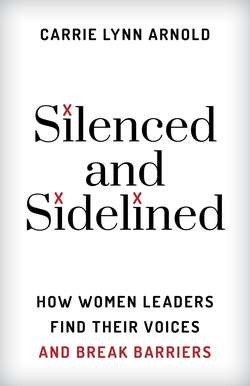Читать книгу Silenced and Sidelined - D Lynn D Arnold - Страница 25
На сайте Литреса книга снята с продажи.
Feeling Silenced Can Make You Sick!
ОглавлениеFeeling silenced manifests into all kinds of different health issues. If I chose to stay silent, actually, I think I would have been dead. I think it would have killed me. Because I was able to find my voice, that’s actually what kept me alive, and it kept me going.
—Construction Company Chief Operating Officer
Joyce and I met at a restaurant, and it was clear within minutes of sitting down to conduct the interview, that she was someone I would love to call a friend. She had a presence about her and an ability to use silence and listen at expert levels. Joyce asked me smart questions about the research, my plans, and what I hoped to learn. She engaged with a sense of openness and curiosity that made it hard for me to believe she had ever suffered from the extreme forms of silencing she would soon disclose.
As a free thinker, Joyce was consistently rewarded for her ability to challenge systems and find new ways of approaching her work. She had a track record of success with several promotions—some included being on political cabinets. She was often the only woman in the roles she held or the only female at the table. However, when she landed at the executive table, things changed. “The understanding was once you get to a senior vice president position, reporting to the CEO, essentially I was told be a good soldier, shut up, and just follow along.”
I asked Joyce to share with me the emotional and physical impact of feeling silenced. These are her words.
It felt awful, demoralizing. I questioned my own leadership abilities, that maybe I wasn’t an effective leader. I knew I was being undermined. It affected me mentally because I started questioning everything I was doing. I’d question it too much. Health-wise it took its toll. I ended up with massive ulcers in my stomach, my esophagus, and in my intestinal tract. I probably gained sixty pounds in about four years. Then when I was on a flight, my stomach tore. I was rushed to the hospital. I lost a third of my stomach, three-fourths of my intestinal tract. My esophagus was a wreck. I ended up having everything rebuilt. There was a good chance that I wasn’t going to survive. They put me back together.
How does a woman go from a successful career with promotions, a strong following, and a track record of success to feeling like a failure on the verge of death? An even more important question, how does one get put back together again? What are the steps in that process?
Recently I was reviewing a call for papers that the International Journal of Environmental Research and Public Health posted. As of April 2018, they were collecting research to publish a special report on stress and health. The guest editors say this in their request: “We know a lot about the causes of stress but much remains unknown about the progression from stress to illness or how we assess and explain this process.”[1]
They go on to request multiple perspectives on the concept of recovery and welcome empirical, theoretical, laboratory, fieldwork, and new methodologies to make sense of this dynamic of stress and health. Embedded in their quest for research is my same question. How does one return to a preexisting baseline of normalcy after experiencing deep psychological stress? I promise you, it is not a quick vacation to a sunny location—rarely is that a lasting cure.
This journal is just one of the hundreds that focus on the concepts of stress and health. From the fatigue of healthcare workers caring for the sick, to bus drivers getting yelled at by their riders, to the stress of combat or preparing for deployment, we want to understand the causes of occupational stress on wellness. Researchers continue to wrestle with nuances and how to measure and correlate what we intrinsically know is happening—that stress makes people sick.
Dr. Sharon Horesh Bergquist is a physician, teacher, and researcher at Emory University. She has a short Ted-Ed video with over 2 million views that boils down how stress affects the body. She explains how stress triggers our adrenal glands to release the hormones cortisol, adrenaline, and norepinephrine. Cortisol messes with our blood vessels, and if there is no return to a healthy baseline, it can increase the risk of heart attack or stroke. Unnecessary adrenaline links to higher blood pressure and heart rate that can cause nervousness and ultimately heart damage. Norepinephrine is a stress hormone that can cause sleeplessness, loss of libido, gastrointestinal problems, and potential disease resistance.[2]
These hormones in healthy doses help the body regulate and stay alive, but like anything overused, they can be damaging. Stress can shift levels in the body and tilt the equilibrium needed for a healthy routine like breathing, digestion, vision, and rest. We do not require extensive research to know stress makes us sick. What we need is to understand the triggers of stress, how stress may muffle or suppress us, and what our healthy preexisting baseline looks like so we can find a way back.
I argue that a healthy preexisting baseline, first and foremost, is having agency and voice!
The stress of silencing and the silencing of stress is cyclical and hidden. Part of the cure is to shed light on this phenomenon and bring it out in the open, so it loses its potency on our brains, hearts, and bodies. This chapter covers some of the ways feeling silenced hits the body like a virus.
